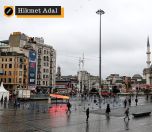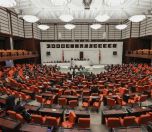* Photo: Council of Europe Newsroom
Click to read the article in Turkish
The Venice Commission has published its opinions that it adopted during its summer plenary session on July 2-3, 2021.
One of the opinions published by the Commission is about the compatibility with international human rights standards of the Law no. 7262 on the Prevention of Financing of the Proliferation of Weapons of Mass Destruction, which has recently passed by Turkey's National Assembly, amending the Law on Associations (No. 2860) and Law on Aid Collection.
In its 23-page opinion on the Law no. 7262, the Venice Commission has indicated that it is "fully aware of the difficult security situation faced by Turkey and the aspiration of the authorities to introduce effective measures to combat terrorism, including measures against its financing."
However, the Commission would like to remind the Turkish authorities that even in such circumstances Member States have to comply with all their obligations under international law, in particular international human rights law, international refugee law, and international humanitarian law, while taking any steps to counter terrorism. Respect for human rights and the Rule of Law are an essential part of any successful counterterrorism effort.
It has also underlined that "the solution chosen by the legislator in Articles 7-17 of Law No. 7262. goes beyond the scope" of the intention to comply with the recommendations provided by the 2019 Financial Action Task Force (FATF) report on Turkey, as well as with the Relevant United Nations Security Council (UNSC) Resolutions cited in the law.
According to the Commission, "the new provisions apply to all associations, irrespective of their goals and records of activities, and lead to far reaching consequences for basic human rights, in particular the right to freedom of association and expression and the right to a fair trial."
'Civil society not consulted'
It has also expressed its regret that "the law was adopted in a rushed manner without any consultation with civil society and other stakeholders, which is problematic from a democratic perspective," underlining that this failure "diminishes its legitimacy and acceptability."
According to the Venice Commission, the "coercive power" of the law "depends on whether it is in conformity with justice and fairness in the eyes of the community whose fate it may determine."
Consultations with all stakeholders and civil society have to take place irrespective of other commitments a state has to comply with.
'It might violate freedom of association'
The Commission has also shared the following opinion:
- The Venice Commission is of the opinion that the provisions relating to aid collection activities of associations could result in a serious restriction of their freedom of association.
- The Commission recognises that there is a risk of funds being used to finance terrorist activities. However, in their indiscriminate scope the new legal provisions on aid collection do not seem to meet the requirements of necessity and proportionality.
- On the other hand, the ambiguity in the wording of the amendments of the Law on Aid Collection, government control over online fundraising attempts in the absence of clear and objective criteria of permit applications, along with the authorities' wide scope to apply sanctions, may have a negative impact on legitimate fundraising activities of NGOs and thus violate their right to freedom of association.
'Ministry cannot dissolve an association'
Raising further concerns about the law, the Commission has said:
"The amendments to the Law on Associations enable the authorities to remove the board members without judicial review and to replace them with trustees who do not need the approval of the members of the association concerned. Consequently, the introduction into the bodies of the association of one or more persons without approval and without clear guarantees that they act in the best interest of the association and its members, constitutes a serious infringement of the right of associations to conduct their own affairs.
While the suspension leading to the dissolution of an association cannot be decided by the Minister of Interior but need a court decision, such decision should be taken only as a measure of last resort, in conformity with the principle of proportionality and with adequate guarantees of fair trial
'Foreign associations'
"Foreign associations, to which Turkish law is applicable for their activities in Turkey, including provisions on data reporting, are equally affected by the flaws of the amendments in question. In addition, imposing upon them the obligation to seek permission for any cooperation activity in Turkey does not meet the requirements of necessity and proportionality."
Recommendation for 're-examination'
In concluding the report, the Venice Commission has shared a series of recommendations, including the following:
The Venice Commission expresses hope that the legislator will carry out a full and thorough re-examination of the aforementioned amendments to the Law on Associations and the Law on Aid Collection, introduced by Law No. 7262 and will ensure broad and inclusive consultations with all stakeholders, with the aim to finding an effective but also lawful solution to the problem of abuse of NGOs for the financing of terrorism or money laundering, while guaranteeing the full protection of fundamental civil and political rights of the civil society associations.
About Venice CommissionThe European Commission for Democracy through Law - better known as the Venice Commission as it meets in Venice - is the Council of Europe's advisory body on constitutional matters. The role of the Venice Commission is to provide legal advice to its member states and, in particular, to help states wishing to bring their legal and institutional structures into line with European standards and international experience in the fields of democracy, human rights and the rule of law. It also helps to ensure the dissemination and consolidation of a common constitutional heritage, playing a unique role in conflict management, and provides "emergency constitutional aid" to states in transition. The Commission has 62 member states: the 47 Council of Europe member states1 and 15 other countries (Algeria, Brazil, Canada, Chile, Costa Rica, Israel, Kazakhstan, the Republic of Korea, Kosovo, Kyrgyzstan, Morocco, Mexico, Peru, Tunisia and the USA). Argentina, Japan, Saint Siege and Uruguay are observers, Belarus has a status of an associate member state. The South African Republic and the Palestinian National Authority have a special cooperation status. The European Commission and OSCE/ODIHR participate in the plenary sessions of the Commission. Its individual members are university professors of public and international law, supreme and constitutional court judges, members of national parliaments and a number of civil servants. They are designated for four years by the member states, but act in their individual capacity. Gianni Buqicchio, Italy, has been President of the Commission since December 2009. The Commission works in three areas:
The Commission shares the standards and best practices adopted within the countries of the Council of Europe beyond its borders notably in neighboring countries. Its permanent secretariat is located in Strasbourg, France, at the headquarters of the Council of Europe. Its plenary sessions are held in Venice, Italy, at the Scuola Grande di San Giovanni Evangelista, four times a year (March, June, October and December). * Source: Venice Commission official website |
(PT/SD)






-132.jpg)



